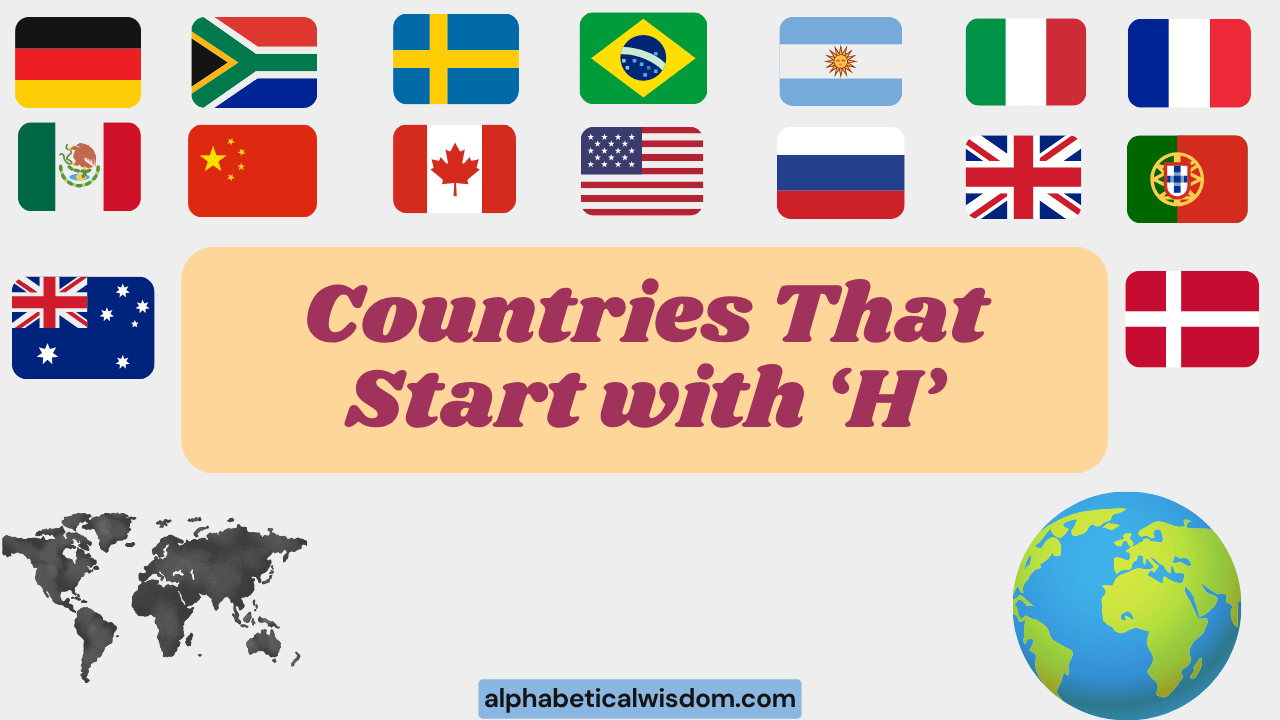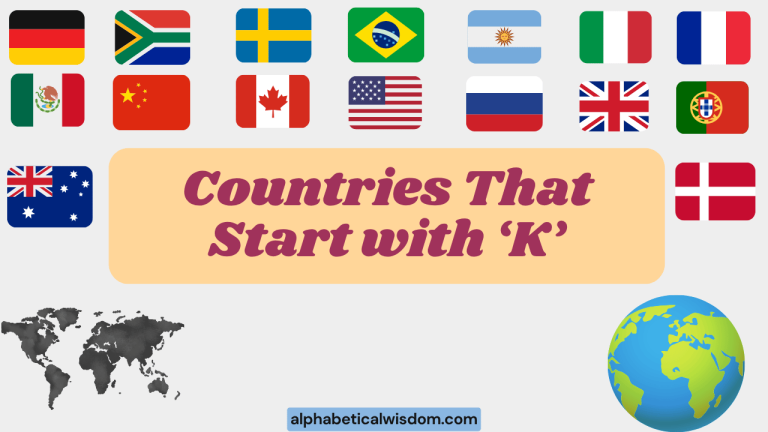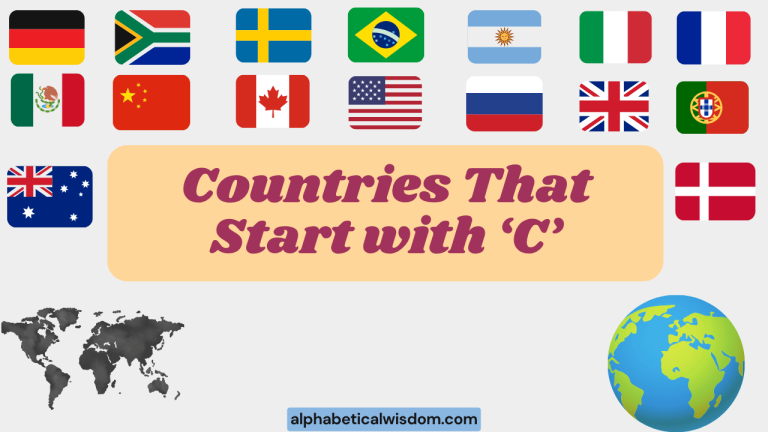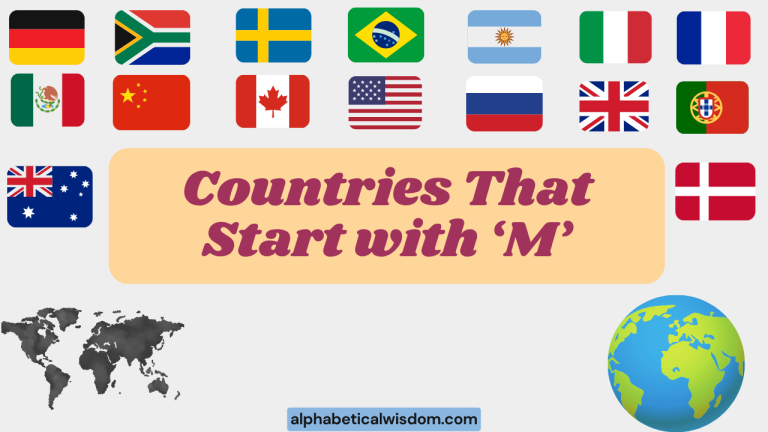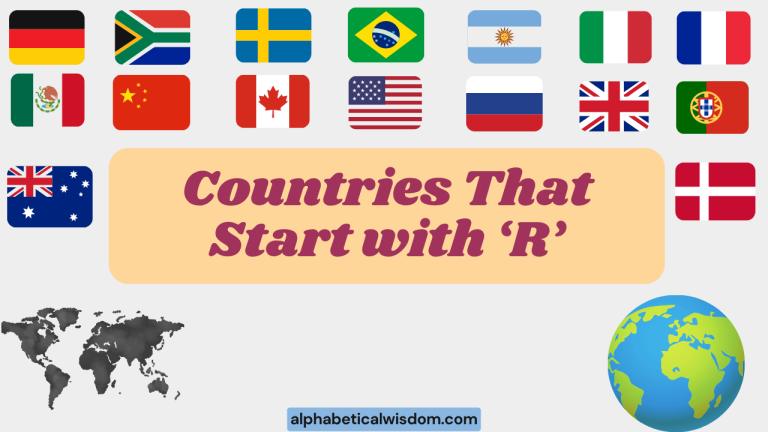Countries Starting with H: Grammar, Usage & Examples
Understanding the grammatical nuances associated with country names, particularly those starting with the letter “H,” is crucial for clear and accurate communication in English. This article provides a comprehensive guide to the proper usage of these country names, covering aspects such as article usage, adjective forms, and common grammatical errors.
It’s designed for English language learners, educators, and anyone seeking to improve their grammatical accuracy when discussing countries beginning with “H”. Mastering these concepts will enhance your writing and speaking skills, ensuring you convey your message effectively and professionally.
Table of Contents
- Introduction
- Definition: Countries Starting with ‘H’
- Structural Breakdown
- Types and Categories
- Examples
- Usage Rules
- Common Mistakes
- Practice Exercises
- Advanced Topics
- FAQ
- Conclusion
Introduction
Country names are fundamental components of language, serving as identifiers for nations and their people. The correct grammatical usage of these names, especially concerning articles, adjectives, and possessive forms, is essential for precise communication.
Focusing on countries that begin with the letter “H,” this article aims to clarify the grammatical rules and conventions that apply. By understanding these rules, learners can avoid common errors and express themselves more confidently and accurately.
This detailed exploration will not only improve your grammar but also enhance your global awareness. We will delve into specific examples, usage guidelines, and practical exercises to solidify your understanding.
Whether you’re writing an academic paper, engaging in casual conversation, or simply expanding your knowledge, this guide will provide valuable insights into the linguistic landscape of countries starting with “H.” Let’s embark on this grammatical journey together!
Definition: Countries Starting with ‘H’
A country name is a proper noun that identifies a specific sovereign state. When referring to countries starting with “H,” it’s important to understand that these names function as singular nouns and often require specific articles or adjective forms depending on the context.
The grammatical behavior of these names can vary, making it essential to learn the specific rules associated with each country.
Classification: Country names fall under the category of proper nouns. Function: They serve to identify and distinguish individual nations. Contexts: They are used in various contexts, including geographical descriptions, political discussions, economic reports, and cultural exchanges. Understanding these aspects is crucial for accurate and effective communication.
Proper Nouns and Country Names
Proper nouns are specific names for people, places, or things, and they are always capitalized. Country names are a subset of proper nouns.
Since they are unique entities, they are treated differently from common nouns. For example, you say “a city,” but you don’t typically say “a Hungary.”
The Role of Articles
Articles (a, an, the) are determiners that specify whether a noun is definite or indefinite. Most country names do not require an article. However, there are exceptions, such as “The Netherlands,” where the article “the” is an integral part of the name. Understanding when to use articles with country names is vital for grammatical correctness.
Structural Breakdown
The structure of sentences involving country names starting with “H” is generally straightforward. These names usually function as subjects, objects, or complements within a sentence.
The key is to ensure correct verb agreement and to use the appropriate adjective form when describing something related to the country.
Subject-Verb Agreement: Like any noun, a country name must agree with the verb in number. Since country names are singular, they generally take singular verbs. For example, “Hungary is a beautiful country,” not “Hungary are a beautiful country.”
Adjective Forms: Many countries have corresponding adjective forms that are used to describe things related to that country. For example, the adjective form of “Hungary” is “Hungarian.” This is used in phrases like “Hungarian cuisine” or “Hungarian history.”
Sentence Structure Examples
Let’s examine some sentence structures using countries that begin with ‘H’:
- Subject: Honduras is known for its coffee production.
- Object: I plan to visit Haiti next year.
- Complement: My favorite country is Hungary.
- Adjective: We enjoyed the Honduran coffee.
Types and Categories
While the grammatical rules are generally consistent, it’s helpful to categorize countries starting with “H” based on their geographical location and common usage patterns. This categorization can aid in remembering specific nuances related to each country.
Geographical Categorization
Countries beginning with the letter “H” can be categorized based on their respective continents or regions:
- Europe: Hungary
- North America: Haiti, Honduras
Common Usage Patterns
Another useful categorization is based on how frequently these countries are discussed in everyday conversation or formal writing. This helps in prioritizing which countries to focus on for grammatical mastery.
- Frequently Used: Hungary, Haiti
- Less Frequently Used: Honduras
Examples
Understanding grammar requires practical examples. This section provides extensive examples of how to use country names starting with “H” correctly in various contexts.
These examples are categorized to illustrate different grammatical points.
Example Sentences with Countries Starting with “H”
The following table provides example sentences demonstrating the correct usage of country names starting with “H” in different contexts.
| Country | Example Sentence | Grammatical Focus |
|---|---|---|
| Haiti | Haiti suffered a devastating earthquake in 2010. | Subject of the sentence |
| Haiti | She is studying the history of Haiti. | Object of the preposition |
| Haiti | The culture of Haiti is vibrant and unique. | Possessive “of” usage |
| Honduras | Honduras is known for its rich biodiversity. | Subject of the sentence |
| Honduras | We exported coffee from Honduras. | Object of the preposition |
| Honduras | The economy of Honduras relies heavily on agriculture. | Possessive “of” usage |
| Hungary | Hungary is a member of the European Union. | Subject of the sentence |
| Hungary | He traveled to Hungary for a business conference. | Object of the preposition |
| Hungary | The capital of Hungary is Budapest. | Possessive “of” usage |
| Haiti | The Haitian flag is red and blue. | Adjective form |
| Honduras | Honduran coffee is highly regarded. | Adjective form |
| Hungary | Hungarian cuisine is known for its paprika. | Adjective form |
| Haiti | Many people speak Haitian Creole. | Adjective form |
| Honduras | The Honduran government is working on economic reforms. | Adjective form |
| Hungary | The Hungarian language is unique. | Adjective form |
| Haiti | The music of Haiti is influenced by African rhythms. | Possessive “of” usage |
| Honduras | The landscape of Honduras is diverse. | Possessive “of” usage |
| Hungary | The history of Hungary is rich and complex. | Possessive “of” usage |
| Haiti | I am learning about Haitian history. | Adjective + Noun |
| Honduras | They visited the Honduran rainforest. | Adjective + Noun |
| Hungary | We tasted traditional Hungarian dishes. | Adjective + Noun |
| Haiti | She loves to dance to Haitian music. | Adjective + Noun |
| Honduras | The Honduran economy faces many challenges. | Adjective + Noun |
| Hungary | Budapest is the heart of Hungarian culture. | Adjective + Noun |
Adjective Forms in Detail
Using the correct adjective form is crucial when describing something related to a country. The following table provides more examples of this usage.
| Country | Adjective Form | Example Sentence |
|---|---|---|
| Haiti | Haitian | The Haitian people are resilient. |
| Haiti | Haitian | We enjoyed Haitian coffee during our visit. |
| Honduras | Honduran | Honduran cigars are known for their quality. |
| Honduras | Honduran | The Honduran government is implementing new policies. |
| Hungary | Hungarian | Hungarian folk music is very lively. |
| Hungary | Hungarian | She is studying Hungarian literature at the university. |
| Haiti | Haitian | He speaks Haitian Creole fluently. |
| Haiti | Haitian | The Haitian art exhibit was very impressive. |
| Honduras | Honduran | Honduran cuisine is a blend of indigenous and Spanish flavors. |
| Honduras | Honduran | The Honduran economy is dependent on agriculture. |
| Hungary | Hungarian | Hungarian wines are gaining international recognition. |
| Hungary | Hungarian | The Hungarian Parliament is located in Budapest. |
| Haiti | Haitian | This is a traditional Haitian dance. |
| Haiti | Haitian | Haitian culture is rich in traditions. |
| Honduras | Honduran | The Honduran rainforest is a biodiversity hotspot. |
| Honduras | Honduran | We visited the Honduran capital city. |
| Hungary | Hungarian | She has a Hungarian passport. |
| Hungary | Hungarian | The Hungarian language is part of the Finno-Ugric family. |
| Haiti | Haitian | The Haitian education system is improving. |
| Haiti | Haitian | He is a Haitian citizen. |
| Honduras | Honduran | The Honduran people are friendly. |
| Honduras | Honduran | They are selling Honduran crafts at the market. |
| Hungary | Hungarian | Hungarian architecture is stunning. |
| Hungary | Hungarian | The Hungarian government is investing in renewable energy. |
Possessive Forms
To show possession or relationship, you can use the possessive form. Here are some examples using countries starting with “H.”
| Country | Example Sentence | Explanation |
|---|---|---|
| Haiti | Haiti’s economy is struggling. | Shows possession using apostrophe + s. |
| Haiti | The problems of Haiti are complex. | Uses “of” to show relationship. |
| Honduras | Honduras’s main export is coffee. | Shows possession using apostrophe + s. |
| Honduras | The culture of Honduras is diverse. | Uses “of” to show relationship. |
| Hungary | Hungary’s capital is Budapest. | Shows possession using apostrophe + s. |
| Hungary | The history of Hungary is fascinating. | Uses “of” to show relationship. |
| Haiti | Haiti’s recovery is ongoing. | Shows possession using apostrophe + s. |
| Haiti | The future of Haiti depends on stability. | Uses “of” to show relationship. |
| Honduras | Honduras’s climate is tropical. | Shows possession using apostrophe + s. |
| Honduras | The beauty of Honduras attracts tourists. | Uses “of” to show relationship. |
| Hungary | Hungary’s location in Europe is strategic. | Shows possession using apostrophe + s. |
| Hungary | The traditions of Hungary are celebrated. | Uses “of” to show relationship. |
| Haiti | Haiti’s challenges are significant. | Shows possession using apostrophe + s. |
| Haiti | The resilience of Haiti is admirable. | Uses “of” to show relationship. |
| Honduras | Honduras’s potential for growth is high. | Shows possession using apostrophe + s. |
| Honduras | The resources of Honduras are abundant. | Uses “of” to show relationship. |
| Hungary | Hungary’s contributions to art are well-known. | Shows possession using apostrophe + s. |
| Hungary | The architecture of Hungary is impressive. | Uses “of” to show relationship. |
Usage Rules
Several rules govern the proper usage of country names starting with “H.” These rules cover article usage, adjective formation, and verb agreement. Adhering to these rules ensures grammatical accuracy and clarity.
Article Usage
Most country names do not require articles. However, there are exceptions.
For countries starting with “H,” none of them require the definite article “the.”
Correct: “I visited Hungary last year.” Incorrect: “I visited the Hungary last year.”
Adjective Formation Rules
The formation of adjectives from country names varies. Some common patterns include adding suffixes like “-an,” “-ian,” or “-ese.” For example:
- Haiti -> Haitian
- Honduras -> Honduran
- Hungary -> Hungarian
Verb Agreement Rules
Country names are singular nouns and require singular verbs. For instance:
Correct: “Honduras is a beautiful country.” Incorrect: “Honduras are a beautiful country.”
Common Mistakes
English language learners often make specific mistakes when using country names. Recognizing these common errors can help you avoid them in your own writing and speaking.
Incorrect Article Usage
One common mistake is using the definite article “the” with country names that do not require it. For example:
Incorrect: “I am going to the Hungary.” Correct: “I am going to Hungary.”
Incorrect Adjective Form
Using the wrong adjective form is another frequent error. Ensure you use the correct adjective form for each country.
Incorrect: “I love Hondura food.” Correct: “I love Honduran food.”
Incorrect Verb Agreement
Failing to use the correct verb form can also lead to errors. Remember that country names are singular and require singular verbs.
Incorrect: “Haiti have a rich culture.” Correct: “Haiti has a rich culture.”
Practice Exercises
To solidify your understanding, complete the following practice exercises. These exercises cover article usage, adjective formation, and verb agreement.
Exercise 1: Fill in the Blanks (Article Usage)
Fill in the blanks with the correct article (a, an, the) or leave it blank if no article is needed.
| Question | Answer |
|---|---|
| 1. I want to travel to ______ Hungary next year. | 1. (no article) |
| 2. ______ Haiti is an island nation. | 2. (no article) |
| 3. He is from ______ Honduras. | 3. (no article) |
| 4. She studied history in ______ Hungary. | 4. (no article) |
| 5. The earthquake devastated ______ Haiti. | 5. (no article) |
| 6. ______ Honduras is known for its coffee. | 6. (no article) |
| 7. We visited several cities in ______ Hungary. | 7. (no article) |
| 8. ______ Haiti has a complex history. | 8. (no article) |
| 9. I’ve always wanted to see ______ Honduras. | 9. (no article) |
| 10. She is learning about the culture of ______ Hungary. | 10. (no article) |
Exercise 2: Choose the Correct Adjective Form
Choose the correct adjective form to complete each sentence.
| Question | Answer |
|---|---|
| 1. He enjoys ______ (Haiti / Haitian) music. | 1. Haitian |
| 2. She is studying ______ (Honduras / Honduran) culture. | 2. Honduran |
| 3. They tasted ______ (Hungary / Hungarian) cuisine. | 3. Hungarian |
| 4. The ______ (Haiti / Haitian) government is working on reforms. | 4. Haitian |
| 5. We visited the ______ (Honduras / Honduran) rainforest. | 5. Honduran |
| 6. He speaks ______ (Hungary / Hungarian) fluently. | 6. Hungarian |
| 7. The ______ (Haiti / Haitian) people are resilient. | 7. Haitian |
| 8. She bought a ______ (Honduras / Honduran) souvenir. | 8. Honduran |
| 9. They explored ______ (Hungary / Hungarian) history. | 9. Hungarian |
| 10. The ______ (Haiti / Haitian) flag is beautiful. | 10. Haitian |
Exercise 3: Correct the Verb Form
Choose the correct verb form (is/are) to complete each sentence.
| Question | Answer |
|---|---|
| 1. Hungary ______ a landlocked country. | 1. is |
| 2. Haiti ______ located in the Caribbean. | 2. is |
| 3. Honduras ______ known for its bananas. | 3. is |
| 4. Hungary ______ a member of the EU. | 4. is |
| 5. Haiti ______ still recovering from the earthquake. | 5. is |
| 6. Honduras ______ facing economic challenges. | 6. is |
| 7. Hungary ______ rich in cultural heritage. | 7. is |
| 8. Haiti ______ a country with a complex history. | 8. is |
| 9. Honduras ______ a beautiful country. | 9. is |
| 10. Hungary ______ a popular tourist destination. | 10. is |
Advanced Topics
For advanced learners, let’s delve into more complex aspects of using country names starting with “H,” including idiomatic expressions and nuanced grammatical constructions.
Idiomatic Expressions
While there aren’t many common idioms directly involving the names of countries starting with “H,” understanding how these names can be used metaphorically is important. For example, one might say “It’s like sending coals to Newcastle,” but a similar expression directly using Haiti, Honduras, or Hungary is rare.
Nuanced Grammatical Constructions
Advanced learners should also focus on using country names in complex sentence structures and understanding the subtle differences in meaning that can arise from different word choices. For example, compare:
- “The history that shaped Hungary is complex.”
- “Hungary’s shaping history is complex.”
Both sentences are grammatically correct, but they emphasize different aspects of the country’s history. The first focuses on the history that influenced Hungary, while the second focuses on Hungary’s role in shaping history.
FAQ
Here are some frequently asked questions about the grammatical usage of country names, specifically those starting with “H.”
- Do I need to use an article before country names like Hungary, Haiti, or Honduras?
No, you generally do not need to use an article (a, an, the) before these country names. They are proper nouns and usually stand alone. For example, you would say “I visited Hungary,” not “I visited the Hungary.”
- What is the correct adjective form for Haiti?
The correct adjective form for Haiti is Haitian. For example, you would say “Haitian culture” or “Haitian food.”
- Is it correct to say “Haiti are” or “Haiti is”?
The correct form is “Haiti is.” Country names are singular nouns and therefore require singular verbs. So, you would say “Haiti is a beautiful country.”
- How do I show possession when using a country name like Honduras?
You can show possession using either the possessive apostrophe (‘s) or the preposition “of.” For example, you can say “Honduras’s economy” or “the economy of Honduras.” Both are grammatically correct.
- Are there any exceptions to the rule that country names don’t need articles?
Yes, there are exceptions, but these exceptions don’t apply to countries starting with “H.” Some country names, like “The Netherlands,” require the definite article “the” as part of their official name.
- Can I use country names as common nouns in any context?
No, country names are proper nouns and should always be capitalized. They should not be used as common nouns.
- What is the adjective form for Hungary?
The adjective form for Hungary is Hungarian. For example, “Hungarian cuisine” or “Hungarian language.”
- How can I improve my usage of country names in English?
Practice is key. Read articles and books that use country names frequently, pay attention to how native speakers use them, and complete grammar exercises to reinforce your learning. Additionally, focus on learning the correct adjective forms for each country.
- What resources are available to help me learn more about country names and grammar?
There are many online grammar resources, including websites, grammar guides, and language learning apps. Additionally, textbooks and language courses can provide structured lessons and exercises.
- Is there a difference in meaning between “Haitian history” and “the history of Haiti”?
While both phrases refer to the same subject, “Haitian history” often implies a focus on the cultural or societal aspects of Haiti’s past, while “the history of Haiti” is a more general reference to the events that have occurred in the country. The difference is subtle but can influence the tone and emphasis of your writing.
Conclusion
Mastering the grammatical rules for country names, particularly those starting with “H,” is essential for accurate and effective communication in English. This article has provided a comprehensive overview of these rules, covering article usage, adjective formation, verb agreement, and common mistakes.
By understanding and applying these guidelines, learners can improve their fluency and confidence when discussing countries and international topics.
Remember to practice regularly and pay attention to how native speakers use country names in various contexts. Consistent effort and attention to detail will help you avoid common errors and communicate more effectively.
With a solid understanding of these grammatical principles, you’ll be well-equipped to discuss global issues and express yourself clearly and accurately.
